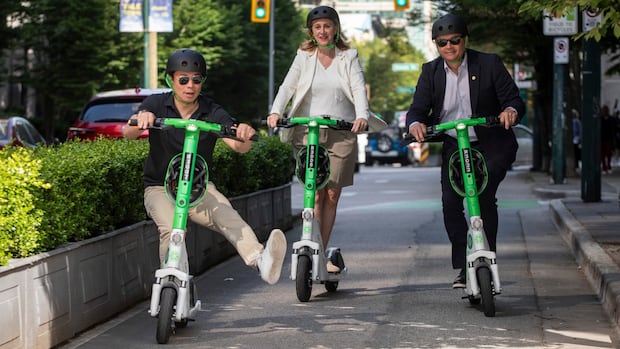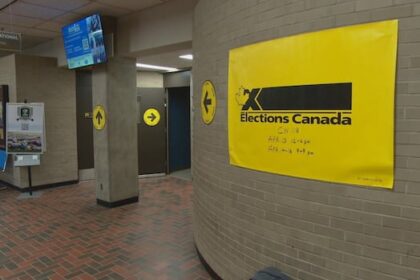British ColumbiaLime Micromobility, the operator of Vancouver’s shared electric scooter service, celebrated its one-year anniversary of operating in the city in September. But some advocates think there needs to be more emphasis on public education to make sure riders are safe.The company says there have been more than 400,000 rides in the last yearLauren Vanderdeen · CBC News · Posted: Oct 01, 2025 8:00 AM EDT | Last Updated: 34 minutes agoCarling Dick, a Lime Canada spokesperson, rides a Lime e-scooter in Vancouver, B.C., to celebrate a year of shared micro-mobility in the city on Sunday. (Martin Diotte/CBC)The operator of Vancouver’s shared electric scooter service celebrated one year in the city in September, as some pedestrian and cycling advocates push for stricter enforcement and more public education.Lime Micromobility says residents have taken more than 400,000 e-scooter rides in the last year.”Vancouverites are embracing the service,” said Carling Dick, a Lime Canada spokesperson.Dick said the number of rides increased by 400 per cent over the summer after the service expanded to Vancouver’s downtown.”The numbers speak for themselves,” she said.WATCH | Vancouverites mark one year of e-scooting in the city: As e-scooter sharing marks milestone in Vancouver, advocates call for more enforcementVancouver’s shared electric scooter service, operated by Lime, is celebrating one year and more than 400,000 rides across the city. And it’s hoping to expand e-mobility to more areas across the province. But as Tanushi Bhatnagar reports, advocates say a lack of infrastructure and enforcement is leading to a growing public safety concern.Lime now operates about 700 scooters, according to Dick, and the company hopes to expand to more neighbourhoods in the future.But some advocates still have safety concerns — and not without reason.Vancouver Mayor Ken Sim, left, and councillors Sarah Kirby-Yung and Mike Klassen ride on Lime shared e-scooters after announcing the expansion of the service earlier this year. (Ben Nelms/CBC)Over a one-year period across Canada, there was a 32 per cent increase in e-scooter injuries from 375 in 2022-23 to 498 in 2023-24, according to data from the Canadian Institute for Health Information (CIHI).There were 84 cases of falls involving e-scooters in B.C. in 2022-23 and 88 cases in the 2023-24 fiscal year, according to CIHI.Advocates want more educationTwo different advocacy groups are hoping the province does more to teach residents about micro-mobility devices — which include small, low-speed and light-weight vehicles like e-scooters and electric unicycles.Vic Leach, a pedestrian safety advocate with the Walkers’ Caucus group, said there needs to be more education about how to safely use micro-mobility devices — particularly for young people who are under 18 years old.”It makes it very difficult, because they don’t have an idea about the rules of the road,” Leach said.He worried for the safety of both young people riding the scooters and other people on the sidewalks.Leach said he hopes to see higher fines and more education around micro-mobility.Vic Leach, a pedestrian safety advocate with the Walkers’ Caucus, says he wants to see higher fines and more education around micro-mobility devices like e-scooters. (Martin Diotte/CBC)Penalties for not following the rules range from fines between $109 and $2,000 or having the e-scooter impounded, according to the province.The law requires riders to wear helmets and be at least 16 years old; it restricts riders from carrying passengers, riding on the sidewalk or crosswalk and riding while impaired or distracted.Navdeep Chhina, director of campaigns at cycling advocacy group HUB Cycling, encouraged governments to build safe and connected transportation networks.”We want to create a network that takes people to the destinations where they want to be and that is the key,” he said.”We need to reallocate the road space so that people can safely walk, bike [and] ride their scooters.”Chhina noted driving education also needs to be updated to include how to interact with new forms of battery-powered vehicles, like e-bikes and e-scooters, on the road.It’s illegal to ride an e-scooter in Vancouver while using a phone. (Ben Nelms/CBC)While police in Toronto have recently held a micro-mobility enforcement blitz, in which officers handed out more than 3,500 tickets over three weeks, Vancouver police say e-scooter rule enforcement isn’t currently a priority.”But it’s fair to say incidents increase during the summer, and we sometimes respond to conflicts or to reports of people engaging in unsafe behaviour,” Const. Tania Visintin said in an emailed statement. Lime spokesperson Dick noted safety is important to the company, and highlighted various safety features on the scooter — including an audible alert to notify riders that they shouldn’t be on the sidewalk.Lime also has shared e-scooter service in Richmond, Port Moody, Coquitlam and Kelowna, as well as e-bikes in New Westminster.It says it hopes to expand to more locations across the province.ABOUT THE AUTHORLauren Vanderdeen is a web writer for CBC British Columbia. She formerly worked for community newspapers, including the Burnaby Now and New West Record. You can reach her at lauren.vanderdeen@cbc.ca.With files from Tanushi Bhatnagar, Cory Correia and Akshay Kulkarni
Lime celebrates one year of shared e-scooters in Vancouver, amid safety concerns











